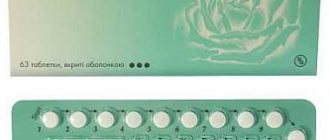Indications for discontinuation of Regulon
Regulon is a hormonal contraceptive drug used for routine contraception. In addition to protecting against unwanted pregnancy, the drug normalizes the menstrual cycle and reduces the severity of PMS symptoms. However, in some cases it is necessary to stop taking the drug:
- if a woman wants to get pregnant;
- if a woman is not sexually active;
- if you become concerned about the side effects of Regulon;
- if additional barrier contraception is necessary;
- if a woman becomes pregnant while taking Regulon.
Medical indications for stopping birth control pills:
- liver diseases;
- diabetes;
- arterial hypertension;
- dyslipidemia;
- varicose veins;
- malignant neoplasms;
- diseases of the organ of vision;
- upcoming operations.
After giving up the contraceptive within 2-3 months, the woman’s reproductive function is restored, that is, the connection between the cerebral cortex, hypothalamus, pituitary gland and ovaries is restored. Gradually, the ovaries begin to function: the egg matures in them, ovulation occurs, and then, if pregnancy does not occur, the corpus luteum remains. This whole process is accompanied by the release of its own hormones.
A healthy woman who took the drug for contraception should not have negative consequences after stopping it. But every woman is individual, and you cannot be absolutely sure that there will be no side effects. The rate of resumption of ovulation processes after stopping the contraceptive depends on the properties of the drug, the age and health of the woman, and most importantly, on the duration of taking the drug.
The instructions for the drug specify contraception and pregnancy prevention as the main purpose of its use. Regulon is also prescribed to restore the cycle, with hormonal imbalances, and to eliminate the diseases listed below:
- uterine tumor;
- abdominal cramps during regulation;
- development of endometriosis and adenomyosis;
- formation of cysts in the mammary glands and internal genital organs.
The medication is indicated for bleeding in the uterus and low concentrations of progesterone in the body due to abortion. Studies indicate almost 100% protection against pregnancy on the days of using the medication. However, you can use tablets if you know all the rules for taking them. For example, if a woman misses a pill, she may need to take an additional dose later and replace the oral contraceptive with a local one.
What happens if you start taking Regulon after menstruation?
Regulon is an oral contraceptive used to prevent unwanted pregnancy, to treat hormonal imbalances, and menstrual disorders. Prescribed for uterine fibroids in the initial stages of development. This is a hormonal drug, so there may be situations when menstruation comes seriously late after stopping Regulon.
To understand why the delay occurred and what needs to be done, you need to know the principle of action of the drug and the features of its administration.
Operating principle of Regulon
The main active ingredients of Regulon are progestin, desogestrel and ethinyl estradiol. The composition of the drug provides the following effect on the body:
- prevents unwanted conception;
- normalizes the menstrual cycle;
- minimizes the symptoms of premenstrual syndrome;
- eliminates uterine bleeding, which is caused by improper functioning of the gonads and hormonal imbalances.
Menstruation is controlled by the pituitary gland; when this gland begins to work incorrectly, the cycle may be disrupted. The drug Regulon has a depressing effect on the production of the hormones LH and FSH, which are produced by the pituitary gland.
The egg matures more slowly, and sperm have a barrier to penetration into the uterine cavity.
Hormones affect the fallopian tubes, due to decreased functionality of which the speed of movement of the egg in them decreases.
Due to the reduced level of LH and FSH, the maturation of the germ cell slows down, the corpus luteum does not form and the follicle does not rupture. For the same reason, an insufficient thickness of the endometrial layer is formed.
On average it is 1 cm, but when taking pills it decreases to 4 mm. Even if fertilization of the egg has occurred, it will not be able to attach to the endometrium.
Such a thin layer will not provide the fertilized egg with the number of vessels it needs for nutrition.
How to take it correctly
In order not to provoke the development of serious complications and consequences, the drug should be taken correctly.
It is necessary to start drinking Regulon from the first day of menstruation. You don't have to use additional protection methods. If the start of the course was on the 2-5th day of menstruation, the pills must be combined with other methods of contraception for another week.
If menstrual flow has been going on for more than 5 days, taking Regulon is useless; to start the course you need to wait until new menstruation comes.
You need to take 1 tablet per day, preferably at the same time . This dosage regimen reduces the likelihood that several germ cells will mature at once due to hormonal imbalance.
The maximum time difference between taking the drug should not exceed 1 hour. Hormones must enter the body regularly so that there is no sharp drop in their concentration.
If Regulon tablets are taken at different times, their contraceptive effect is reduced and additional means of protection must be used.
You need to take the drug for 21 days in a row, then take a 7-day break. This week there will be spotting. Exactly one week later you need to start taking a new pack of the drug, even if your critical days have not yet ended.
How to quit
It is important to follow the rules for using the drug and stop taking it correctly so as not to provoke unpleasant reactions from the body. You need to consult a gynecologist and, based on his recommendation, choose the best time to quit Regulon.
You need to think especially carefully about throwing pills if they are prescribed to obtain a therapeutic effect. The treatment regimen provides for a certain duration of taking the drug. By violating it, you can harm the therapy and not get rid of the problem.
It is forbidden to stop taking Regulon halfway through the pack; you need to finish the pack and not buy a new one. Otherwise, irregularities in the menstrual cycle may occur, which will need to be restored over a fairly long period. This is fraught with uterine bleeding.
You need to stop taking Regulon according to a clear plan developed by your doctor. It takes into account the individual characteristics of the body, the purpose of prescribing the drug and the duration of use.
Cycle while taking the drug
When taking the drug correctly, critical days begin during its withdrawal period, that is, when the woman takes the 21st tablet and stops taking it for a week.
During the first three months, the female body adapts to the action of the pills, during which time intermenstrual spotting may appear.
There is no need to be afraid of this, and even more so, you should not suddenly stop taking the contraceptive, since such manifestations in the first months of use are a variant of the norm. To make sure that spotting is normal, you can additionally consult with your gynecologist.
You should consult a doctor if there is no menstruation after completing the package.
The reasons may be individual characteristics of the body, hormonal imbalance, pregnancy, especially if there has been a violation of the drug regimen. A delay in menstruation when taking Regulon can be caused by a sharp decrease in body weight, poor diet and stressful situations.
Source: https://karma-laws.ru/chto-budet-esli-nachat-prinimat-regulon-posle-menstruacii/
Action of the medication
Regulon contains ethinyl estradiol, which is an estrogen-type component, desogestrel and progestin. The effect of the drug occurs due to blocking the production of hormones by the pituitary gland. The production of substances that affect menstrual periods decreases. Gestagens block the formation of luteinizing and follicle-stimulating components. Ovulation stops and the sperm is unable to fertilize the egg.
The effect of ethinyl estradiol is to change the consistency of mucus formed in the cervix. Penetrating into a woman’s body, the sperm enters an aggressive microflora and cannot continue further advancement. The egg matures slowly, the development of yellow formation is inhibited, and the follicle remains intact. Underdevelopment of the endometrium appears.
If the zygote is successfully formed, the cell will not be able to gain a foothold in the uterine cavity. The nutrition of the fertilized egg will also be insufficient. The contractility of the uterine tubes will decrease, and the egg will not be able to move through them at the required speed. However, in some situations, the components of the drug negatively affect the course of menstruation and there is a delay after Regulon is discontinued, or menstruation does not end.
When will your period stop after taking Regulon for the first time?
The composition of the oral contraceptive Regulon includes:
- prevention of unwanted pregnancy;
- treatment of the menstrual cycle;
- minimizing the manifestations of premenstrual syndrome;
- uterine bleeding caused by improper functioning of the ovaries and unstable hormonal levels.
The pituitary gland in the female body is responsible for menstruation. When it is dysfunctional, the cycle becomes unstable.
The active components of Regulon have a depressing effect on luteinizing and follicle-stimulating hormones produced by the pituitary gland.
The phenomenon inhibits the process of egg maturation and creates a barrier to the penetration of sperm into the uterine cavity. Hormonal substances inhibit the functioning of the fallopian tubes, reducing the speed of movement of eggs.
A decrease in luteinizing and follicle-stimulating hormones slows down the formation and maturation of the egg, preventing the formation of the corpus luteum and rupture of the follicle. Moreover, the endometrium is formed in insufficient quantities. The thickness of the endometriosis layer before Regulon is 1 cm, and while taking the drug - no more than 4 mm.
Provided that the sperm and egg have passed all protective measures and fertilization has occurred, the fertilized egg is not able to strengthen in the uterine cavity. All this is due to the fact that the endometrium is not developed enough and does not allow the formation of the required number of vessels for nutrition and proper development of the fertilized egg.
Bleeding that occurs before menstruation is called implantation bleeding. It usually occurs within a week or 10...
Other reasons for the appearance
Alarming symptoms in gynecology are: pain, bleeding and pathological discharge from the vagina. The appearance of traces of blood or spotting brown discharge may indicate the development of a serious pathology that requires immediate treatment.
The most common causes:
Sexually transmitted infectious diseases (gonorrhea, trichomoniasis). Most often, the secretion is brown. Characteristic signs of the inflammatory process are discomfort during sexual intercourse, pain, and unpleasant odor.
Regulon cancellation rules
To finish taking the drug, you need to finish all the tablets from the package, completing the next menstrual cycle. Abrupt withdrawal of Regulon in the middle of the cycle is undesirable, but is allowed if such alarming symptoms occur as:
- high blood pressure;
- leg pain;
- dyspnea;
- jaundice;
- skin itching;
- pain in the right hypochondrium;
- nausea or vomiting.
After 3-4 months of taking Regulon, a woman’s body recovers very quickly. After finishing the last package of the drug, you can plan a pregnancy without taking a break.
If a woman took the drug for 6 months or more, then it will take 2-3 months to restore reproductive function. Due to long-term use of the contraceptive, the endometrium wears out (atrophies). Under such conditions, implantation of a fertilized egg is less likely.
After long-term use of Regulon for 5-15 years, careful withdrawal of the drug is necessary with a gradual reduction in the dose of hormones, under the guidance of a gynecologist.
Note! Taking Regulon leads to a deficiency of folic acid, so after stopping the drug it is necessary to replenish the reserves of this vitamin.
How to use correctly
In order for the contraceptive to have the desired effect, the first days of menstruation should serve as the beginning of taking the medication. It is better to use the medicine immediately when bleeding appears. A delay of 5 days is possible. For the first week after starting use, you must use local contraception.
Therapy continues for 21 days. Then you need to take a week's break. The second or third day after stopping Regulon is the time when your period will come. Bloody discharge may appear later - within a seven-day period. Menstruation indicates the cessation of the effect of the medicine. On the 29th day of the cycle, taking OK is resumed with a new package. It is advisable to check with your gynecologist how long to repeat the course.
Menstrual cycle after Regulon withdrawal
There are several rules for using the drug and correctly stopping its use: It is undesirable to take pills for a long period and skip a dose. If a woman intends to conceive and carry a child in the future, after several months of treatment with Regulon, it is necessary to take regular breaks. This way, the reproductive function of the body will have time to recover.
Before stopping the medicine, you should consult a gynecologist. It is safest to stop using the product with the last capsule from the package. The risk of negative consequences will be minimized, and a situation where there are no periods after Regulon is discontinued will not occur.
The effect of the tablets remains for 7 days after finishing taking it. Then, to avoid pregnancy, you need to switch to barrier contraception. If a woman wants to conceive a child, it is better to wait until the third menstruation after the end of the course. During this time, the reproductive organs should resume functioning. Also, before conceiving, be sure to undergo a full body check in the clinic.
There are situations in which the medication has to be stopped urgently. Immediate cessation of use of the drug occurs in case of sudden surges in pressure (arterial pressure reaches 140/90), spasms in the legs, and breathing problems.
Side effects that may occur while using an oral contraceptive include jaundice, skin rash, nausea, gastrointestinal pathologies, constant lethargy and fatigue, itching for no reason and liver problems. Such situations require immediately stopping the medication and contacting a doctor.
You can not wait until 21 days of therapy and stop taking it if serious injuries and burns have occurred, surgery is planned, or there is an urgent need to use inductive drugs for kidney oxidation, medications for seizures, tranquilizers and antidepressants.
After taking medications that affect the concentration of hormones in the body, each woman’s body reacts differently. Some patients drink Regulon, but their periods do not stop; for others, their menstrual periods arrive with a delay. After three months of using the drug, deviations in the menstrual cycle appear due to the body getting used to changes in hormonal levels.
- Pregnancy.
- Non-compliance with the diet.
- Fast weight loss.
- Frequent stress and anxiety.
- Symptoms of intoxication.
- Gastrointestinal pathologies.
Hormonal imbalances can occur due to stress. An increase in the concentration of some organic substances is also associated with pregnancy. Conceiving a fetus is possible if oral contraceptives are taken incorrectly.
Side effects of the drug associated with the gastrointestinal tract can provoke signs of intoxication. A woman suffers from diarrhea and nausea. The drug does not enter the bloodstream and is not absorbed.
After finishing taking the drug, the menstrual cycle is restored within 1-3 months. It is possible that PMS symptoms will reappear (headache, weakness, irritability), pain will resume, or these manifestations will become less pronounced. It all depends on how strong these manifestations were initially.
At first, menstruation may be scanty, and its volume does not increase much after stopping the contraceptive. But after three months, the volume of discharge normalizes and becomes the same as it was before taking the drug. The duration of scanty periods in the first 1-3 cycles ranges from 7 to 14 days.
If a woman stops taking the contraceptive halfway through the package, spotting brown discharge is possible for up to two weeks. They are triggered by a sharp drop in the level of sex hormones in the middle of the menstrual cycle.
In general, in the first three months the body is rebuilt, and both scanty (which happens more often) and heavy periods are possible. The reason for contacting a gynecologist should be scanty discharge that lasts too long (more than 2 weeks) or heavy periods, accompanied by weakness and pain in the lower abdomen.
After drinking the last pill from the package, menstruation should begin within 1-3 days, unless the contraceptive was taken for too long (6 months or more). And after a long course of taking a contraceptive drug, your period may be delayed for several months until the body begins to produce its own hormones again.
It happens that withdrawal bleeding does not occur. After long-term use of COCs, the female body needs time to resume the production of its own hormones. Pregnancy cannot be ruled out as the reason for the absence of menstruation. If pregnancy is not confirmed and there are no menstruation for 3 or more cycles, then this may be a manifestation of secondary amenoria.
Secondary amenorrhea develops against the background of ovarian hyperinhibition syndrome in 0.7% of women. This small percentage includes women who, most often, already had menstrual dysfunction before starting Regulon. Another reason for the development of secondary amenorrhea: taking reserpine, phenothiazine or narcotic drugs together with taking Regulon.
The mechanism of ovarian hyperinhibition is to block the synthesis of GnRH by the hypothalamus and develop hyperprolactinemia.
Ovarian hyperinhibition syndrome is confirmed by ultrasound results (multifollicular ovaries and hypoplastic endometrium, no more than 4-5 mm) and the results of hormone studies (FSH, LH and estradiol levels are below normal).
Scanty periods a few days after stopping COCs are a normal reaction of the body to changing hormonal levels. If pregnancy develops while taking the drug, it may also initially manifest itself as scanty bleeding. Bloody discharge after discontinuation of Regulon
Bloody discharge after stopping a hormonal contraceptive is a withdrawal syndrome, which is a normal reaction of the female body. Discharge can last up to 14 days. Their duration depends
- depending on the patient’s age: the older she is, the longer the bleeding lasts;
- on the duration of taking the drug: the longer the use lasted, the longer the discharge was observed.
After discontinuation of Regulon, brown discharge may be observed, and this is a normal reaction of the body. A small amount of blood, particles of atrophied endometrium and platelets give the discharge a brown color.
Against the background of prolonged suppression of ovarian function, the vessels supplying the walls of the uterus become thinner. When hormone levels drop and menstruation begins, these vessels can become severely damaged and cause breakthrough bleeding. Such a side effect of the drug is rare if the rules of administration are followed. But if a woman stops taking the drug halfway through the pack, breakthrough bleeding is more common.
Pain in the lower abdomen after completing a course of COCs may be associated with increased work of the ovaries after a long break. This side effect of the drug goes away as normal ovarian function is restored.
If a woman took a contraceptive for 3-4 months, then she can become pregnant in the first month after completing the course. In this case, pregnancy is often accompanied by the fertilization of two eggs and the birth of twins.
If you use a contraceptive for a longer period of time, it is recommended to wait until the normal menstrual cycle is restored (up to 3 months) and then plan a pregnancy.
Valentina Lyapunova, general practitioner, especially for Mirmam.pro
Menstruation while taking Regulon: doctor's answers
Regulon is a low-dose monophasic estrogen - a progestin contraceptive. The contraceptive pharmacological effect of the drug is to inhibit the synthesis of follicle-stimulating hormone (FSH) and luteinizing hormone (LH). Thus, the ovulatory rise in LH is blocked, and, accordingly, ovulation is blocked.
Regulon contains 30 µg ethinyl estradiol (estrogen component) and 150 µg desogestrel (gestagen component). It is the gestagenic component that is involved in such contraceptive effects as:
- Reduced rate of contraction of the fallopian tubes, which slows down the passage of the egg;
- Suppression of the mitotic activity of the endometrium, which leads to its premature secretory transformation, and then to hypotrophy. All this violates the conditions for implantation of a fertilized egg.
- Increased viscosity of cervical mucus, which prevents sperm from passing through the cervical canal.
The estrogenic component enhances the contraceptive effect of Regulon, and also improves the lipid profile, increasing HDL, and reduces androgen-dependent symptoms.
Regulon: instructions and dosage regimen
You need to start drinking Regulon on the first day of your period and take it for 21 days. This is followed by a seven-day break, during which a menstrual-like reaction is observed. On the eighth day, you need to resume taking the drug, even if the bleeding has not stopped yet.
You can switch to Regulon from another contraceptive drug the next day after completing the 28-day course of the previous drug or after taking a seven-day break.
In the postpartum period, you can take Regulon 3 weeks after birth only if the woman is not breastfeeding.
If a woman forgets to take a pill, but less than 12 hours have passed, she should take the next pill as soon as possible, and then take the pills at the usual time.
Important! If more than 12 hours have passed since the moment when the pill should have been taken, then the contraceptive effect is no longer guaranteed.
If you miss a pill at 1-2 weeks of the cycle, you need to take two pills, and then continue taking the drug regularly, while using a condom for 7 days.
And if a pill is missed in the 3rd week of the cycle, then 1 missed pill is taken and there is no seven-day break in this cycle.
How do periods change when taking Regulon?
The first menstruation that begins after taking 1 tablet of Regulon will proceed as usual, and then scanty spotting is possible for 2-3 cycles. During this time, your period may start a little earlier or later. Within three months, the female body adapts to the new level of sex hormones in the blood. Three months later:
- the menstrual cycle stabilizes: menstruation will come from the 23rd to the 28th day of the cycle;
- discharge becomes less abundant and longer lasting;
- PMS symptoms disappear;
- pain syndrome is relieved.
How long does your period last when taking Regulon?
When taking Regulon, menstruation begins during a seven-day break, when the concentration of hormones in the blood drops. In the first three months, while using the drug, the duration of menstruation may be reduced to 2-3 days. In the future, after adaptation, when taking Regulon, menstruation lasts from 3 to 5 days.
Scanty periods when taking Regulon
Menstruation when taking contraceptives, including Regulon, becomes scanty and does not contain mucous inclusions. These changes occur under the influence of the main components of the drug.
Ethinyl estradiol replaces natural estrogen in a woman’s body and since its concentration is lower than what is normal in a woman, it does not ensure proper proliferation of the endometrium. The endometrium does not grow more than 3-5mm.
The gestagen component also affects the reduction in the volume of secretions: under the influence of desogestrel, endometrial hypotrophy develops, that is, the size of the endometrial layer decreases and the number of blood vessels decreases.
Heavy periods against the background of Regulon
Heavy bleeding is a side effect of Regulon and can occur in the first three months, when the menstrual cycle has not yet established. Prolonged, heavy periods of bright red color indicate breakthrough bleeding.
This pathology can occur due to an insufficient dose of ethinyl estradiol in the drug, or, for example, when missing another pill, or if a woman stops drinking Regulon.
It is possible that the concentration of ethinyl estradiol is reduced due to impaired absorption of the drug due to vomiting or diarrhea.
Breakthrough bleeding, in addition, may indicate pathological conditions such as endometriosis, uterine fibroids, and polyps.
Note! Smoking has an anti-estrogenic effect to some extent, which means it can also cause bleeding.
Regulon and brown discharge
Minor brown discharge can normally be observed at the beginning and end of menstruation. Brown discharge and clots do not stop for a long time in such pathological conditions as:
- hormonal imbalance, including during the formation of the menstrual cycle or during menopause;
- endometriosis, endometrial hyperplasia, polyps;
- cervical erosion;
- ectopic pregnancy;
- inflammatory diseases of the reproductive organs;
- sexually transmitted diseases;
- anorexia.
When taking Regulon, brown discharge is considered one of the side effects of the drug. They occur against the background of suppression of the ovaries and due to an increase in the level of platelets in the blood.
I take Regulon: my periods are not pumping
Most often, when taking Regulon, menstruation does not stop and lasts more than 7 days in the first three months, which is again due to the restructuring of the body. The lack of estrogen component affects the fact that bleeding does not stop in time.
I take Regulon: why I don’t have periods
A delay in menstruation when taking Regulon is possible in the first three months during the period of adaptation of the female body to the drug. If you do not have your period while taking Regulon, you must take a pregnancy test.
If the result is negative, you can continue taking the drug. A certain percentage of women may lose their periods, and this is normal when taking Regulon.
This may be due to developed endometrial atrophy.
Regulon for delaying menstruation
To delay the next bleeding, you need to take Regulon without a seven-day break between the first and second package of the drug. It is not recommended to delay menstruation for more than three cycles due to the possibility of breakthrough bleeding. Find out whether it is harmful to delay your period with oral contraceptives.
Valentina Lyapunova, general practitioner, especially for Mirmam.pro
Source: https://mirmam.pro/mesyachnye-pri-prieme-regulona
The effect of the drug on the body after use
Regulon can delay menstruation by a week due to the extensive influence of the components of the product on the hormonal balance in the female body.
After stopping the use of the drug, a restructuring of the reproductive and endocrine systems occurs. While taking OCs, the ovaries and adrenal glands produce relatively small amounts of hormones. Therefore, the organs need time to resume work in a natural mode. Sometimes critical days may be absent for two months after the end of the course of therapy.
If you drink the drug, it may have a negative effect on other body systems:
- excessive hair loss, dullness and fragility;
- dry skin, causeless flaking and itching.
After Regulon, there may be heavy periods or an increase in the duration of menstruation by several days. However, long-term use of the drug stimulates the pituitary gland. Since the body lacks hormonal components, increased production of biological substances of the luteinizing and follicle-stimulating type is stimulated. The ovaries begin to work better. Therefore, the drug is rarely, but still used as a means of therapy for infertility.










